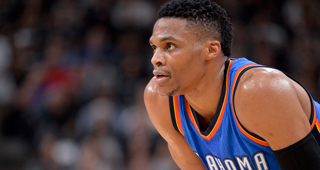When the Houston Rockets ran through their defensive sets at shootaround on Tuesday, much of the focus — at least during the portion available to the media — was shining a spotlight specifically on the different variations of the Russell Westbrook high pick-and-roll. To quote Stan Van Gundy: They were practicing building a (bleeping) wall.
That’s not how Oklahoma City came out and attacked Wednesday night, however. The Rockets knew the Thunder were going to bring adjustments along with them in Game 2 — they’d been saying so all week at practices and shootarounds — but without the benefit of reconnaissance missions (OKC was practicing at the University of Houston shortly after the Rockets ran their practice at the Toyota Center Tuesday), it was going to be difficult to guess the direction from which the changes would come.
Oklahoma City went away from the pick-and-roll to start the second game of the series — it opted for a more post-oriented approach with cutters flying around and, obviously, getting Westbrook the ball in situations that made it difficult on the defense to double-team the ball-handler — and it was quite successful. The Thunder found themselves in situations where, not only could they handle individual one-on-one opportunities, but they put their big men in positions where they could attack the glass. There is not a better rebounding team in the league than Oklahoma City, so moving away from the high pick-and-roll meant the bigs were in advantageous spots.
After being outrebounded, 56-41, in the first game of the series, the Thunder outrebounded the Rockets, 48-37, in Game 2. That early adjustment kept the frontcourt in a place where it could impact the proceedings and open things up for Westbrook offensively.
On the other side of things, Houston was prepared for the opposition’s MVP candidate from the start of this series. The Thunder averaged just 0.62 points per possession from the ball-handler on pick-and-rolls during the first game, per Synergy data. But once Oklahoma City caught Houston off-guard with something that wasn’t the Westbrook pick-and-roll, everything opened up, and Russ started to go nuts.
As good as Patrick Beverley is, he can’t stick with Westbrook in mano-a-mano situations. Nobody can. When Russ found himself in situations where he wasn’t being surrounded by a prepared defense loaded up and ready for him to attack specific areas of the floor, he had opportunities to freelance and, very simply, overwhelm his defender with his athleticism.
If a defense comes in ready to deal with the pick-and-roll, and suddenly the opposing offense reverses the course for which you were prepared, it’s going to leave you in a bit of a scramble. The Thunder executed well the majority of the night, and once you get the defense off-balance, you go back to the thing that butters your bread. Russ started firing on all cylinders. He was a whirling dervish crossed with a lightning bolt once he discovered the breakdowns in protection against him. Nobody could stop him, and it just felt like one of those nights where he’d be setting records. Hell, he did, becoming the first 50-point triple-double in NBA Playoff history.
Thunder ball-handlers (mostly Westbrook) averaged 1.14 points per possession out of pick-and-rolls in Game 2, which is obviously a huge jump from the first game. The team looked fluid and disciplined after really struggling to score in Game 1, and there was consistent scoring and a defense that once again kept the Rockets off the 3-point line (just 29 attempts after only 33 in the first game), which is where they kill you.
But things seemed to really fall apart once the Rockets made their run at the end of the third quarter. Suddenly, the Thunder seemed to fall away from every positive thing they’d done all night.
Westbrook started to build tunnel vision as the game got tight. Every time Houston inched closer or jumped out in front, he was taking it upon himself to hit back — a mindset he’s always had that can offer incredible results or be detrimental to the team. Ya never know what’s going to happen. But as the game got closer and as the minutes piled up (Russ played nearly 42 minutes) the passes and shots began to get shaky.
Everything looked laborious. Every shot seemed short. Every defender was a little more difficult to beat. A guy will never tell you he’s tired, but how could you not be after playing an entire fourth quarter in an NBA Playoff game?
It’s easy to place blame on Russ when he’s going 4-of-18 in the fourth quarter, but if we’re being honest, the Thunder have lived and died by their superstar all season.
Oklahoma City had a great chance to win Game 2, but let it slip away. They came in doing things a bit differently and it worked for most of the game, until it didn’t. The scariest aspect of the Rockets was put on display Wednesday: If you’re going to throw your best punch at them, you’d better get way out in front because they can catch up in a hurry.



